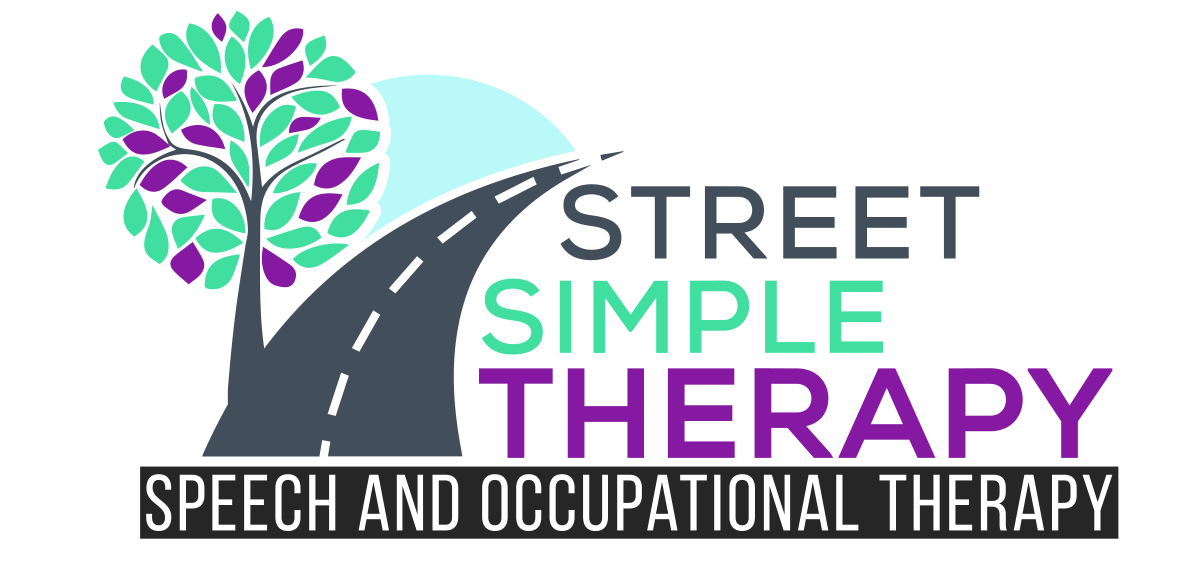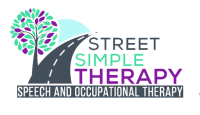Speech and communication are vital parts of the human experience. Yet, for many, disorders like childhood apraxia of speech, stuttering, and other fluency issues can make verbal expression extremely challenging. At Street Simple Therapy, we specialize in compassionate, personalized treatment plans to help both children and adults improve their speech fluency.

Childhood Apraxia of Speech: Identification and Exercises
Childhood apraxia of speech (CAS) is a motor speech disorder that makes it difficult for children to accurately produce sounds, syllables and words despite having normal intelligence and no muscle weakness. The exact cause of CAS is unknown, but it’s likely due to abnormal brain development affecting the brain’s ability to plan movements involved in coordinating the lips, jaw, and tongue needed to produce speech sounds.
Some signs that may indicate CAS in young children:
- First words emerge late, after age 2
- Difficulty moving lips, jaw, and tongue on command
- Inconsistent speech errors and difficulty repeating words
- Shortened sentences as utterances become more complex
If you suspect your child may have speech apraxia, early evaluation and treatment are crucial to supporting their communication development. At Street Simple Therapy, our licensed speech-language pathologists have advanced training to accurately diagnose CAS and provide customized treatment plans that combine gesture cues, tactile input, and traditional articulation therapy.
We also provide parents with helpful exercises and activities to practice at home in daily routines, which helps reinforce the motor planning skills children need to improve speech intelligibility. Our compassionate, play-based methods help remove the frustration from therapy so children remain motivated and engaged with each session’s goals.
Some helpful strategies include:
Oral-Motor Exercises: Activities like blowing bubbles and horns, sucking through a straw, and licking food off a spoon help strengthen mouth muscles. This improved control facilitates the forming of sounds.
Sound Production: A speech-language pathologist models proper sound production and then helps the child practice, first in isolation, then in syllables, words, phrases, and sentences.
Rhythm and Timing: Tapping, swinging arms, marching to music, and reciting rhyming verse develop a steady beat that supports smooth speech flow.
Touch Cues: Gentle touch cues, like lightly tapping the lips to prompt a “b” sound, offer added sensory input to activate speech movements.
Consistency Across Environments: Parents and teachers reinforce therapy gains by modeling correct sounds and syllables during daily activities.
While CAS persists into adulthood for some, early intervention taking advantage of neuroplasticity often leads to significant gains. Adults may continue working on refining and maintaining speech clarity.
Speech Fluency Strategies for Adults Who Stutter
Stuttering is a disruption in the natural flow of speech where sounds, syllables, or words may be frequently repeated or prolonged. This fluency disorder in adults is most common in young children as their language skills develop, but it can persist into adulthood in nearly 1% of the population.
Exercises for stuttering for adults has both genetic and neurologic components, but anxiety can also exacerbate symptoms. Some common characteristics of stuttering include:
- Repetition of initial sounds of words, like “b-b-ball”
- Prolongation of certain sounds, like “ssssunny”
- Complete blocks where no sound is produced despite effort
Our team provides personalized therapy plans to help adults manage their stuttering for improved fluency and communication confidence. We specialize in methods like:
- Controlled fluency shaping – Practicing smooth, controlled speech using short utterances and then gradually increasing length.
- Cognitive behavioral therapy – Identifying and modifying thought patterns around stuttering
- Desensitization – Slowly increasing exposure to scenarios that provoke anxiety to reduce fear of stuttering
Additionally, it is important to teach important compensation strategies adults can use when needed to maintain fluency:
- Rate control – Speaking at a slightly slower rate
- Gentle onset – Easing into voicing sounds with smooth breath flow
- Cancellation – Stopping an utterance and restarting the thought
Our individual therapy plans are tailored to the unique needs of each client. We also understand that consistency is key, which is why we offer flexible scheduling options to accommodate different lifestyles and commitments.
Holistic Support for Fluency Disorders
At Street Simple Therapy, our speech-language pathologists have advanced specialty training and decades of combined experience helping adults and children overcome speech sound disorders and disfluencies. We provide comprehensive evaluations to accurately identify areas of difficulty and then develop kind, engaging treatment plans that accommodate each person’s needs and goals.
Whether your child struggles to coordinate the complex mouth movements needed for intelligible speech or you experience frustrating blocks and repetitions when speaking, our compassionate therapists will listen and craft a personalized plan just for you. Through consistent practice of customized articulation strategies and fluency-shaping techniques, we’ve helped countless clients achieve meaningful improvements in verbal communication.
We believe speech therapy should empower, not frustrate, clients. Our therapy rooms provide judgment-free spaces for clients to develop skills at their own pace through interactive games and activities. And we partner closely with families to make treatment plans work within busy schedules.
If you or a loved one experiences difficulties with producing clear speech or maintaining fluency, contact the caring professionals at Street Simple Therapy today.
1370 N Fairfield Rd, Ste G Beavercreek, OH 45432
Phone: 937-210-4565
Fax: 833-561-2444
Email: dbrooks@streetsimpletherapy.com We also offer teletherapy sessions in addition to in-clinic services for your convenience. Contact us to schedule a compassionate, no-cost assessment so we can start helping you or your child achieve speech and fluency goals sooner. Call 937-210-4565 today!


